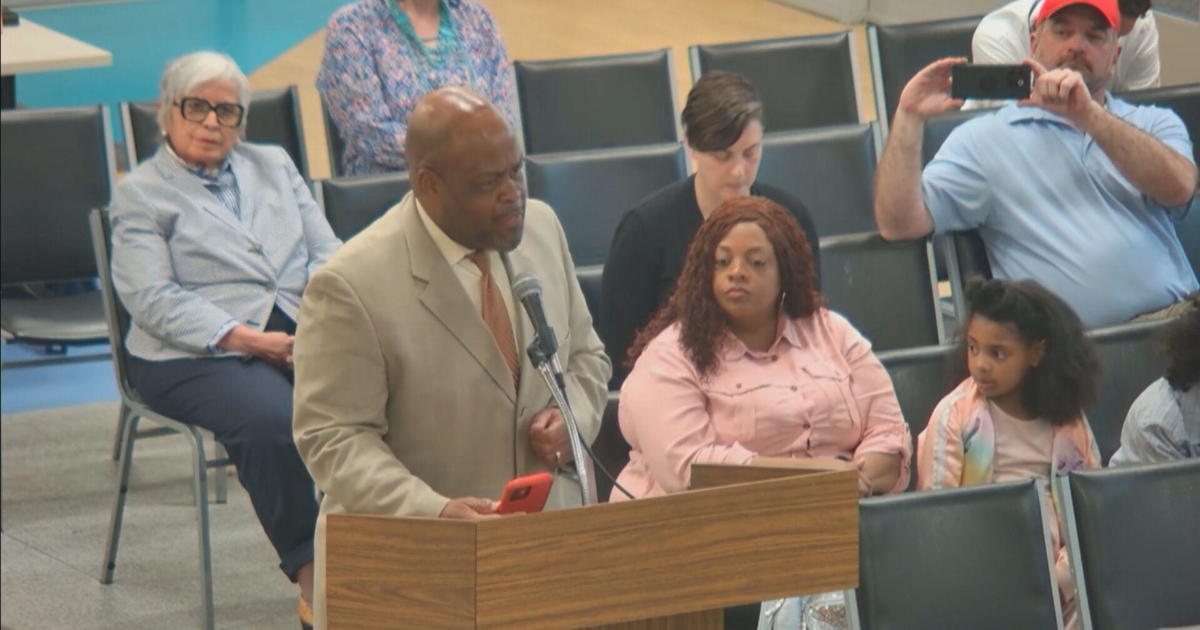Parolee Accused Of Murder Escaped 6 Times, Released, Placed On Low Supervision
DENVER (CBS4)- A 4 On Your Side Investigation has learned that Warren Watson, a Colorado prison parolee who fled from parole and confessed to a murder in Lakewood, had a long history of such escapes but had still been placed on a comparatively low level of supervision by Colorado's Division of Parole.
"I think we handled the Warren Watson case the best we could have based on our assessment of the case," said Tim Hand, Director of Adult Parole for Colorado.
But the 4 On Your Side Investigation found a series of missteps, miscommunications and questionable judgments in the Watson case, much like in the case of parolee Evan Ebel, who is suspected of murdering Colorado's Corrections Director and a young father while Ebel was on parole. The parole department is examining its handling of the Ebel case.
Internal Colorado parole records now show that the Colorado parole board decided to release Warren Watson from prison about three years early, based in part on internal assessments that suggested the 52-year-old career criminal was "low risk" for recidivism.
Internal records show that during his last four years in prison, Watson had not been a management problem. His record shows 10 felony arrests with crimes stretching from Oklahoma to Colorado and Indiana.
But in a matter of weeks after being released, Watson fled from parole and authorities say he confessed to sexually assaulting and murdering lawyer Claudia Miller in her Lakewood office March 5.
Parole documents obtained by CBS4 show that Watson had escaped from a community corrections program in 1992, walked away from a Colorado penal institution in 1993, "absconded" Colorado parole in 1996 and then again absconded from parole in Ohio in 1997.
The records detail Watson escaping again from community corrections in 2006 and fleeing to Texas, then finally escaping community corrections in 2008 and fleeing to Mississippi.
Watson's criminal history included violence. CBS4 found records showing he served eight years in prison in Indiana in 1993 for an armed bank robbery.
Despite that history earlier this year, two members of the state parole board, who are appointed by Colorado's Governor, voted to release Watson from prison early on what's known as a "discretionary release."
"He was a risk for running away but not for committing another felony," said Dr. Anthony Young, Chairman of the Parole Board who defended the decision to release Watson early from prison.
Young was asked if the parole board had made a bad decision in allowing Watson out of prison three years early.
"We regret the fact he was granted discretionary parole and made a bad decision by his own behavior," said Young. "Mr. Watson made a very bad decision, a lethal decision perhaps. With anyone granted discretionary parole theres a risk involved and we do our best to assess the risk."
One former Colorado parole officer who reviewed the Watson case at the request of CBS4, was taken aback that the parole board opted to release Warren Watson three years prior to the end of his sentence.
"It surprised me he was released early based on his extensive criminal history."
The former officer asked that their identity not be revealed for fear of jeopardizing future employment.
In documents granting Watson's release from prison, the parole board gives the parole department the option of putting Watson on intensive supervised parole which would involve daily phone calls with a parole officer, electronic monitoring, and frequent face to face visits with a parole agent and have the offender on a short leash. But parole department administrators decided that was unnecessary and placed Watson on "regular" parole which provides much less supervision, no daily contact or electronic monitoring.
Hand said ,"Looking at his criminal history and his risk level, we didn't feel like he warranted that (ISP) level of supervision. Based on his criminal history and institutional compliance, there were no indicators warranting him being on ISP."
The former parole officer suggested that with Watson's escape history, "He should have been on a shorter leash like ISP."
Watson was initially sent to a halfway house in Denver after being released. On February 19 at Watson's request, he was allowed to move to a faith based, transitional housing facility for parolees called "Charity's House Ministries," which housed Watson in a small home at 3026 Welton Street along with several other parolees.
The program required him to sleep at the home every night, attend 7 a.m. church services every weekday, Sunday church services and attend nightly classes aimed at helping Watson get his life back on track.
In theory, Watson could only stay on parole and out of prison if he complied with the terms of the Charity's House Ministry program.
The founder and director of the program, Eddie Mae Woolfolk said Watson never obeyed the terms of his deal.
"He came in, put his things and left and wasn't staying in the house like he was supposed to, he wasn't following the rules, wasn't attending church study or those things," said Woolfolk.
"He was non-compliant. For all intents and purposes he came, left his things there and wandered around," observed Woolfolk.
But for the entire time he was assigned to Charity's House Ministries, nobody with the program alerted parole officials to the wayward offender.
"I think we could have done a much better job," said Woolfolk. And since Watson was on "regular" parole, in the time he was assigned to Charity's House Ministry, his parole officer never actually came to the facility to check on Warren Watson or ever called.
Watson made one trip to downtown Denver on February 27 to meet a parole officer face to face.
"If they had checked at night they would have seen he was not there," said Woolfolk.
Woolfolk said until CBS4 shared information with her, she was unaware Watson had repeatedly escaped from parole, just as he would do with her program.
"It tells you he's a runner and most of the time when you find runners unless they've done a lot of changing they just continue to run," said Woolfolk.
Which is precisely what Watson did.
After disappearing from the transitional housing facility, Watson next showed up March 8 when he confessed to investigators that he made an appointment to meet Lakewood attorney Claudia Miller at her law office.
There, he is accused of sexually assaulting and killing Miller and fleeing with her car, and credit cards. Three days later, Watson was arrested in Boise, Idaho where he was arrested for violating his Colorado parole.
He now faces 18 criminal charges ranging from murder to robbery and sexual assault.
Of the multiple authorities involved in the decisions that freed Warren Watson from prison early, put him on a low level of supervision, and kept him in a facility with little or no oversight, only Woolfolk is willing to accept responsibility for what went wrong with Watson.
"I want to be more aware and on top of it than I was in Watson's case," said Woolfolk.
She said in the future, she will make sure she personally screens all parolees accepted into her program.
"I think they (parole) should do like I'm going to do and be more on top of it, do more monitoring, check on their guys constantly to make sure they are where they are supposed to be. He slipped through our cracks and maybe he slipped through their (parole's) cracks. When one like that does slip through, it causes so much pain and so much hurt to so many people."




